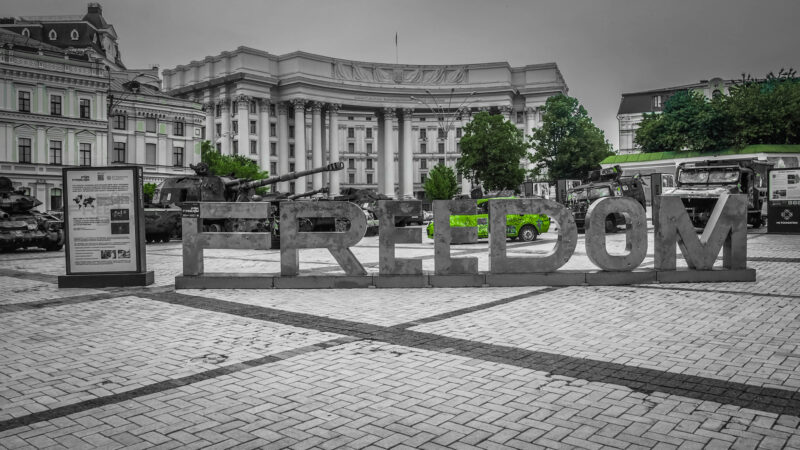Explaining the “Westsplainers”: Can a Western scholar be an authority on Central and Eastern Europe?

Following the 2022 escalated invasion of Ukraine, the terms “Westsplaining” and “Westsplainer” seem to be gaining momentum. They are used in reaction to commentary that is delivered by established Western intellectuals—be they American realists, German idealists, or sometimes even critical scholars from Ireland. Many people from what is typically known as Central and Eastern Europe, as well as some of their Western colleagues, tend to find such commentary not only useless but, in fact, harmful. Far from being purely theoretical academic contemplation, it uses influential Western media forums to provide policy advice that is often based on false assumptions and projections.
At the same time, some Westerners may feel wronged here, as the term “Westsplaining” could sound too much like an attempt to deny them the right to participate in expert debate based solely on their personal background. Without pretending to have a monopoly on the definition, I will try to explain why, in my opinion, the term makes sense and how it can be used critically without being reduced to a vulgar ad hominem.
From “mansplaining” to “Westsplaining”: The birth of the portmanteaux
The term “Westsplaining” is obviously modelled on “mansplaining.” Coined some years ago, “mansplaining” was defined as the intersection between (male) “overconfidence and cluelessness” with respect to women. It was meant to refer to situations when a man tries, in an authoritative manner, to explain to a woman something that she knows better than him anyway.
As such, the term should also be seen as part of a much broader trend of critical thought that urges us to reflect on the backgrounds of speakers—including, above all, ourselves—and think of how they may influence ways in which individuals see the world. Thus, much of contemporary social science seems quite preoccupied with various “positionalities” of researchers. The impact of critical theory on social scientific research has been mixed, as postmodernist relativization of epistemologies has also contributed to mounting ideological pressures in academia. This did not always improve the quality of the scientific debate or of scholarly output (to put it mildly).
Outside the ivory tower, terms like “mansplaining” and “Westsplaining” could also easily be weaponized, as they provided an easy way of attacking the person’s background instead of their arguments. Sadly, for too many people the temptation to go ad hominem is simply too strong to resist.
Having said this, we should probably also remember that the Delphic maxim “know thyself” is much older than any postmodernist critical theory. Therefore, reflecting on oneself—which should be accompanied by acknowledging your own limits—is likely to be a useful exercise.
Is “Westsplaining” about backgrounds?
Spoiler: no, it is not
The original portmanteau (“mansplaining”) could ultimately be justified by the fact that apart from sometimes very different social roles, gender differences are also rooted in experiences that are, so to speak, existential and non-transferable (e.g., childbirth pain). Fortunately, cultural differences are not in any way biological. Despite what Samuel Huntington and his followers may preach, these differences can certainly be overcome—although it does not take place automatically and often requires investing significant amounts of time and intellectual effort.
So, the question of whether a Westerner can become an authority on Central and Eastern Europe—or any other region—is obviously rhetorical. Personally, my favorite example has always been the Norwegian international relations scholar Iver B. Neumann. His analysis of the nexus between Russian identity and foreign policy, to my taste at least, provides a keener understanding of the subject than that which is available to many Russians. Taking a quick look around, I also see people like Andreas Umland and Timothy Snyder, whose admonitions about fascism in Russia we may have taken too lightly; as well as the amazing, multi-lingual Marci Shore, the brilliant erudite Marlène Laruelle, and this is just to quickly throw in a few very “big” names off the top of my head.
Along with many other Western scholars, these people demonstrate to us on a regular basis that differences in cultural background can actually be an asset. They can help us overcome what is known as home blindness, i.e., failing to see certain things because we are used to them.
So, what is Westsplaining about if not backgrounds?
It is very simple. “Westsplaining” is speaking without sufficient expertise but from a position of authority, often making false projections and assumptions that are based on the Western experience but are not necessarily relevant to the region in question. The point is not where you are from. Rather, it is whether you possess the necessary expertise and whether, before you decided to comment, you spent enough time following the region, learning the languages, and gaining some intimate understanding of the countries involved.
Thus, for example, the problem with prominent American international relations realists who are keen to comment on Russia and Ukraine is that they have a very vague notion as to what actually drives Russian foreign policy. To some extent this is rooted in the original sin of their “structural” theory, which famously takes pride in ignoring (“black-boxing”) domestic politics.
This “structural” approach is rather convenient, because it allows one to comment on various regions and countries without specific expertise. It also seems congruent with a (naïve) image of the liberal, globalized world, where different cultural and political contexts are supposed to be progressively converging. This image creates a false sense of universal transparency and relegates country and region-specific expertise and “area studies” as something secondary or residual.
However, following a closer examination, pseudo-universal explanations delivered by some established Western scholars turn out to be merely a form of intellectual parochialism, which takes it for granted that its own Western assumptions are universally applicable. Thus, the aforementioned American international relations realists apparently feel sufficiently emboldened by the wisdom of their universalist theory to provide policy advice on Ukraine. In the process, they make some very naïve assumptions, ascribing to Russia the realist virtues of prudence and cold strategic calculus, i.e., that model of rationality which is often found in their own theories but unfortunately not in the Kremlin. Here, the post–February 24th developments clearly speak for themselves—as even Kremlin-associated policy experts have pointed out.
Russo-centrism is also a part of Westsplaining
Furthermore, Western discourse on Central and Eastern Europe more often than not suffers from distortions caused by its deep Russo-centrism. Too frequently this becomes a discussion about what these countries mean to Russia and how Moscow’s “legitimate” interests could be accommodated without “humiliating” Russia. This is a structural problem of “knowledge production.” Apparently, some Western media outlets have seen no problem when their correspondents report on countries like Belarus from Moscow but not from Minsk. Some Western academics also seem to believe it is enough to know Russian to write about the post-Soviet countries.
This Russo-centrism also borders on what international relations scholars call “great power management,” i.e., the assumption that powerful players can and should talk to Moscow over the heads of Central and Eastern European countries and strike great power deals in the manner of the 19th–early 20th century. Thus, in the new round of debates following the outbreak of the Russo-Ukrainian War, the agency of the people of Ukraine (and of other Central and Eastern European nations) has once too often been overshadowed by “geopolitical” considerations and seemingly smart “realpolitik” approaches. This is where “Westsplaining” probably comes closest to the original “mansplaining,” because its “authoritative” tone also implies a system of hierarchical, unequal relations. This time, not between genders but between nations.
Is “Westsplaining” endemic to the West?
Not at all. Wanting to comment without proper knowledge and understanding seems to be very much “part of the human condition.” It is also a phenomenon to be found among “Eastern European” countries themselves. Thus, I was personally “fortunate” to witness this in 2020 when, in the runup to the presidential “election” in Belarus, the Russian independent commentariat suddenly developed a keen but superficial interest in Belarus. The majority of these people had not followed Belarus systematically before 2020, which ultimately resulted in producing much naïve “Russosplaining” of Belarus and its regime. Linguistic proximity must have played a trick on many Russian commentators, contributing to the sense of false transparency. Later on, Russian spin doctors, who were apparently deployed by the Kremlin to save Lukashenka’s regime following the outbreak of the protests in August 2020, famously fell into a very similar trap.
Incidentally, “Russosplaining” not only stems from the legacy of Russian language domination in the so-called “post-Soviet space” but also from an implicit sense of political, social, and cultural entitlement shared by many Russians. The ambiguous, fuzzy notion of the “near abroad” has long informed their mental maps. The “near abroad” operates as a liminal space that is imagined as being not exactly inside but also not quite outside Russia. Consequently, it was taken for granted that, in this post-imperial space, Russians simply would not run into something they would genuinely not know or understand.
The “Russosplaining” trap and the Postsovieticum
This grand illusion has entailed a general disregard for knowledge of the local “reality on the ground.” Just think of how little the decision-makers in Moscow have cared to know about what was actually happening in Ukraine in terms of its politics, culture, and nation-building. The initial goals of Putin’s “special operation” were meant to prompt a quick regime change in Kyiv, happening against the background of the Ukrainian state collapsing like a house of cards. Moscow’s spectacular failure in Ukraine—where, contrary to its expectations, Russian forces encountered fierce resistance put up by a consolidated Ukrainian nation—should ultimately be attributed to this disregard for knowledge. The arrogant, patronizing imperialist attitude, which treats smaller neighbors as inferior, subordinate, and unimportant, is an integral part of “Russosplaining.”
Unfortunately, at this point, I must add that Ukrainians have also not been immune to the universal illness. Since the start of the popular uprising in Belarus 2020, many Ukrainian commentators adopted a patronizing and sometimes denigrating attitude toward Belarusian protestors. This attitude showed a complete disregard for the obvious differences between the Ukrainian experience, which essentially amounted to organizing popular revolts in an oligarchic democracy, and the Belarusian experience of 2020, which was about facing a consolidated authoritarian regime directly backed by the Kremlin in its critical moments.
This “Ukrosplaining” of Belarus stemmed from a widespread lack of knowledge about the northern neighbour and naïve assumptions that the domestic situation in Belarus generally resembled the one in Ukraine. It also gained new momentum after the regime provided Belarusian territory for the Russian attack on Ukraine in 2022. As the Ukrainian public intellectual Pavlo Zubiuk aptly pointed out, Ukrainian commentary on Belarus also stems from a basic lack of understanding combined with a “chauvinist” attitude.
The habit is universal but “Westsplainers” do more damage
At the end of the day, the sin of “-splaining” seems to be quite universal. Returning to my original point, I think the notion of “Westsplaining” certainly has its merits. But it does only insofar as it does not target the immediate background of the interlocutor but rather the limits of their expertise and insight and their proneness to serve as self-appointed authorities on subjects which they did not spend enough time with.
Unfortunately, all of us are sometimes prone to comment on things we think we understand all too well. However, the problem with Western commentary on the Russo-Ukrainian war in particular is that, compared to voices from Central and Eastern Europe, it enjoys a much higher degree of international influence. In spreading their messages, “Westsplainers” tend to benefit from access to the best-known European and American media outlets that have a global outreach. This is where we should probably return to the original parallels between “mansplaining” and the structural inequalities embedded in the present international system.





It seems rather arbitrary to broad brush the capabilities of any segment of the population with claims like this. Frankly, one is tempted to stop reading once it was asserted that the principal shortcoming of westerners commenting on Eastern Europe was Russo-Centrism. That is simply not true. If anything, westerners were at the forefront of such critical fields as the Holodomor genocide. Gareth Jones, Muggeridge, Buckley, Conquest, Mace….all very much westerners.